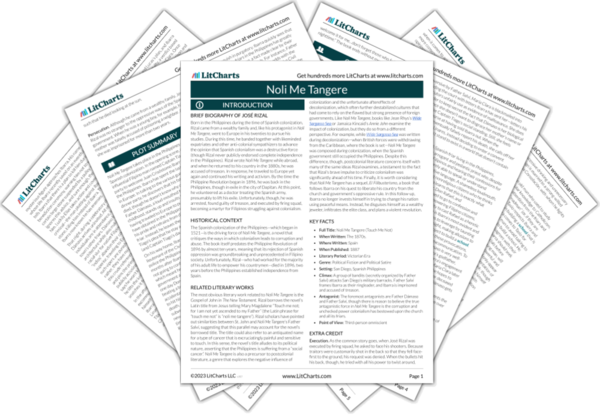Señor Guevara Quotes in Noli Me Tangere
In addition, Don Rafael was an honest man, more just than many men who go to confession. He held himself up to a rigorous moral standard and when the unpleasantness began he often said to me: “Señor Guevara, do you think God pardons a crime, a murder, for example, solely because one tells it to a priest, who is, in the end, a man, and who has the duty to keep it to himself, and who is afraid of burning in hell, which is an act of attrition, who is a coward, and certainly without shame? I have another conception of God,” he would say, “to me one does not correct one wrong by committing another, nor is one pardoned by useless weeping or by giving alms to the church.” He gave this example: “If I kill the head of a family, if I make a woman into a destitute widow and happy children into helpless orphans, will I have satisfied eternal justice if I let them hang me, or confide my secret to someone who has to keep it to himself, or give alms to the priests, who need it the least, or buy myself a papal pardon, or weep night and day? And what about the widow and children? My conscience tells me I should replace as much as possible the person I have murdered and dedicate myself completely and for my whole life to the welfare of the family whose misfortune I have created. And even then, even then, who will replace the love of a husband and father?”

Unlock explanations and citation info for this and every other Noli Me Tangere quote.
Plus so much more...
Get LitCharts A+To be a heretic anywhere is a great disgrace, especially at that time, when the mayor made a great show of his religious devotion and prayed in the church with his servants and said the rosary in a great loud voice, perhaps so that everyone could hear him and pray with him. But to be a subversive is worse than being a heretic and killing three tax collectors who know how to read, write, and sign their names. Everyone deserted him. His papers and books were confiscated. They accused him of subscribing to the Overseas Mail, of reading the Madrid newspapers, of having sent you to German Switzerland, of having been in possession of letters and a portrait of a condemned priest, and who knows what else! They found accusations in everything, even of his wearing a peninsular-style shirt. If he had been anyone other than your father, he would have been set free almost immediately, especially since a doctor had attributed the death of the unfortunate tax collector to a blockage. But because of his wealth, his confidence in justice, and his hatred of anything that was not legal or just, they ruined him.

Señor Guevara Quotes in Noli Me Tangere
In addition, Don Rafael was an honest man, more just than many men who go to confession. He held himself up to a rigorous moral standard and when the unpleasantness began he often said to me: “Señor Guevara, do you think God pardons a crime, a murder, for example, solely because one tells it to a priest, who is, in the end, a man, and who has the duty to keep it to himself, and who is afraid of burning in hell, which is an act of attrition, who is a coward, and certainly without shame? I have another conception of God,” he would say, “to me one does not correct one wrong by committing another, nor is one pardoned by useless weeping or by giving alms to the church.” He gave this example: “If I kill the head of a family, if I make a woman into a destitute widow and happy children into helpless orphans, will I have satisfied eternal justice if I let them hang me, or confide my secret to someone who has to keep it to himself, or give alms to the priests, who need it the least, or buy myself a papal pardon, or weep night and day? And what about the widow and children? My conscience tells me I should replace as much as possible the person I have murdered and dedicate myself completely and for my whole life to the welfare of the family whose misfortune I have created. And even then, even then, who will replace the love of a husband and father?”

Unlock explanations and citation info for this and every other Noli Me Tangere quote.
Plus so much more...
Get LitCharts A+To be a heretic anywhere is a great disgrace, especially at that time, when the mayor made a great show of his religious devotion and prayed in the church with his servants and said the rosary in a great loud voice, perhaps so that everyone could hear him and pray with him. But to be a subversive is worse than being a heretic and killing three tax collectors who know how to read, write, and sign their names. Everyone deserted him. His papers and books were confiscated. They accused him of subscribing to the Overseas Mail, of reading the Madrid newspapers, of having sent you to German Switzerland, of having been in possession of letters and a portrait of a condemned priest, and who knows what else! They found accusations in everything, even of his wearing a peninsular-style shirt. If he had been anyone other than your father, he would have been set free almost immediately, especially since a doctor had attributed the death of the unfortunate tax collector to a blockage. But because of his wealth, his confidence in justice, and his hatred of anything that was not legal or just, they ruined him.











